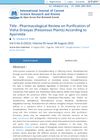7 citations,
May 2017 in “Behavioural brain research” Changing neuroactive steroid levels early in life can affect how adult rats respond to alcohol's stimulating effects.
 4 citations,
August 2022 in “The Scientific World Journal”
4 citations,
August 2022 in “The Scientific World Journal” Merremia peltata leaf extract, particularly the bufotalinin compound, shows potential for treating hair loss.
 2 citations,
September 2021 in “Human Psychopharmacology: Clinical and Experimental”
2 citations,
September 2021 in “Human Psychopharmacology: Clinical and Experimental” Valproate can cause hair problems, but there are ways to manage them.
1 citations,
February 2023 in “Ibrain” Black cumin and its nanoformulations show promise in treating neurodegenerative diseases.
 1 citations,
October 2022 in “international journal of endocrinology and metabolism”
1 citations,
October 2022 in “international journal of endocrinology and metabolism” People with hypothyroidism and hair loss often have more hair and scalp issues than those without thyroid problems.
 1 citations,
February 2021 in “Biodiversitas”
1 citations,
February 2021 in “Biodiversitas” Curcuma aeruginosa rhizome extracts show potential as anticancer agents, with varying effectiveness against breast cancer cells.
1 citations,
January 2019 in “Journal of the Egyptian Women's Dermatologic Society (Print)” Minoxidil 2% is more effective for female hair loss, but botanicals have fewer side effects.
June 2024 in “Regenerative Therapy” Exosomes from stem cells may help rejuvenate skin and regrow hair, but more research is needed.
 May 2024 in “International Journal of Nanomedicine”
May 2024 in “International Journal of Nanomedicine” Biodegradable polymers can improve cannabinoid delivery but need more clinical trials.
 April 2024 in “Lečaŝij vrač”
April 2024 in “Lečaŝij vrač” Valproic acid can cause low platelet counts, especially at high doses or in elderly patients.
 March 2024 in “Organic letters”
March 2024 in “Organic letters” A new method efficiently modifies alkenes to create useful medicinal compounds.
 January 2024 in “Journal of lipid research”
January 2024 in “Journal of lipid research” Finasteride may lower cholesterol and slow heart disease progression.

Some medications, including retinoids, antifungals, and psychotropic drugs, can cause reversible hair loss if stopped or doses are reduced.
 November 2023 in “Brain Sciences”
November 2023 in “Brain Sciences” Some medications might contribute to male infertility, with finasteride showing a high number of reports.
 November 2023 in “Frontiers in Neuroendocrinology”
November 2023 in “Frontiers in Neuroendocrinology” Some people experience lasting sexual, psychological, and sleep problems after using finasteride or SSRI antidepressants, possibly due to similar underlying causes.
 November 2023 in “International Journal of Pharmaceutics”
November 2023 in “International Journal of Pharmaceutics” New hair loss treatment using marine collagen and dissolvable needles improves hair growth.
 May 2023 in “Endocrine, metabolic & immune disorders”
May 2023 in “Endocrine, metabolic & immune disorders” Hibiscus rosa-sinensis is used in traditional medicine and is safe in high doses, with various health benefits.
 April 2023 in “IntechOpen eBooks”
April 2023 in “IntechOpen eBooks” Drug repurposing speeds up drug development, saves money, and has led to about a third of new drug approvals.
 January 2023 in “International Journal of Molecular Sciences”
January 2023 in “International Journal of Molecular Sciences” Maxillariinae orchids contain 62 compounds with potential health benefits, including treating skin conditions and diseases like cancer and diabetes.
 August 2022 in “International Journal of Current Science Research and Review”
August 2022 in “International Journal of Current Science Research and Review” Ayurveda can make poisonous plants medicinal through specific purification processes.
 November 2019 in “Synapse”
November 2019 in “Synapse” Brain-made chemicals can control nerve cell function differently in various parts of a mouse's brain, which may help us understand neurological conditions.
June 2013 in “The mental health clinician” Large data can lead to new medical discoveries and personalized medicine.
February 2009 in “Mayo Clinic proceedings” A woman's new seizures were caused by a brain tumor likely linked to her past cancer treatment, and choosing safe seizure medications is important for women who can have children.
Natural products may help treat hair loss by promoting hair growth with fewer side effects.
 July 2021 in “International journal of homoeopathic sciences”
July 2021 in “International journal of homoeopathic sciences” Homeopathic treatment can help manage alopecia areata in children.
 June 2020 in “Annals of the Rheumatic Diseases”
June 2020 in “Annals of the Rheumatic Diseases” Patients with Systemic Sclerosis have much higher levels of GDF-15, which could help predict organ involvement and guide treatment.
 29 citations,
February 2016 in “Scandinavian journal of urology”
29 citations,
February 2016 in “Scandinavian journal of urology” Late puberty may slightly lower prostate cancer risk, baldness is not linked to overall risk but less so with aggressive types, ibuprofen use may increase risk, and vitamins show no effect on risk.
 12 citations,
January 2004 in “Reproductive biomedicine online”
12 citations,
January 2004 in “Reproductive biomedicine online” Low-dose anti-androgen drugs and certain drug combinations are effective for hirsutism, and insulin sensitizers show promise, especially for those with polycystic ovarian syndrome.
 7 citations,
June 2020 in “Translational Andrology and Urology”
7 citations,
June 2020 in “Translational Andrology and Urology” Finasteride for hair loss may cause lasting sexual, genitourinary, mental, and anti-androgenic side effects in young men.
 4 citations,
May 2022 in “BMC Women's Health”
4 citations,
May 2022 in “BMC Women's Health” High levels of anti-Müllerian hormone can indicate polycystic ovarian syndrome in women who can have babies.






















